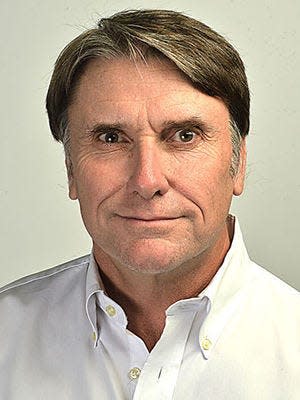Stormy weather for meteorologists: Climate change makes forecasting tough again
If you’re looking for the bright side of climate change, consider that it has made weather forecasts fun again. And by fun I mean wrong.
Forty years ago, before weathermen (the term referred to both sexes) got all chesty with their Doppler radar and their models and their bands and their cells, and started calling themselves “meteorologists,” weather forecasting was a deliciously erroneous business.
I don’t think many forecasters had degrees, nor was there any reason to have one. To predict the weather on the East Coast you just looked at the weather in St. Louis and figured it would get here eventually.

And it was fun. After a botched forecast, you could needle the radio station by calling up and saying that you had just shoveled six inches of “partly cloudy” off your sidewalk. The weathermen were walking punchlines, and they just kind of rolled with it, understanding that they were more entertainer than scientist.
But then forecasters got good, which took all the joy out of it. Forecasts were spooky accurate. I had a contact at the National Weather Service, and she could tell me how much rain we were about to get based on our street address, and be right within a tenth of an inch.
But no longer. Climate change has made things wonderfully unpredictable again, as Mother Nature goes reeling drunkenly down the street. For a while, I thought it was just a local phenomenon. In extreme northern New York we have a lot of mountains, which can throw things off. And we don’t have enough people to be able to afford our own forecasts, so we have to borrow Vermont’s.
Sports:Here are the top 25 defensive players returning to Washington County this football season
These people are nice enough, but they are always predicting “torrential downpours” that never materialize, and if the proffered temps are within 10 degrees of the fact, we consider it a win.
But then I started to notice it’s not just them. The hourly website forecast changes by the minute, as forecasted conditions are erased and replaced by reality. It’s gotten so bad there’s really no use even looking at it anymore.
And I don’t think it’s going to get any better, until we take the approach they just used in Hungary, where, according to The Washington Post, “Two top officials with Hungary’s National Meteorological Service (NMS) were fired Monday after severe storms they had forecast for the capital on the country’s most important national holiday did not materialize, instead passing to the south.”
Professional meteorologists immediately shrieked in protest, saying it sends a “chilling message” to forecasters who get it wrong. Well OK Phil Connors, here’s what you do: Don’t get it wrong. You can bet the next Hungarian forecasters aren’t going to make the same mistake.
No one is going to say, “Hmm, it looks as if these storms are going to miss Budapest, but you know what? Just for laughs, let's call for a flood.”
I suppose it was inevitable that anger-politics would at some point turn its wrath on nature. In Georgia, Herschel Walker is criticizing trees; maybe if he’s elected he can fire a few foresters.
In other news:Struggling Maryland car dealers and tech companies hoping US semiconductor push will help
But no matter how solid an authoritarian you might be, it’s hard to inflict your will on the weather.
And once you start going down that path, it’s not too far a leap from firing weathermen to marking the path you wish the hurricane would have taken with a Sharpie. And who can forget North Korean leader Kim Jong Un getting angry with his state weather forecasters because of a drought.
The weather doesn’t care about your propensity to jail political opponents. A reputation for revenge isn’t going to guarantee you sunny skies. But keep trying, it’s kind of cute, like a toddler shaking his fist at the sky and screaming “Top waining!”
And about as effective.
Tim Rowland is a Herald-Mail columnist.
This article originally appeared on The Herald-Mail: Accuracy takes a hit as climate change mangles forecasting
